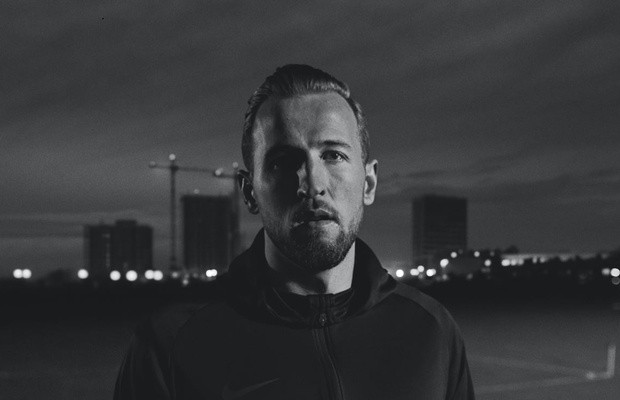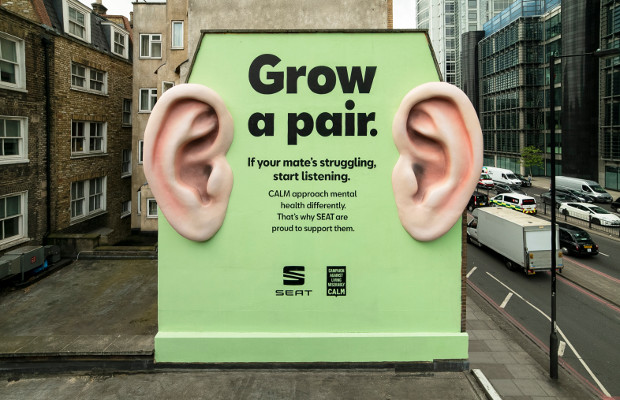
Building a Healthier Masculinity

The Book of Man describes itself as “the men’s media brand for The New Masculinity Movement”, which is a refreshing - if bold - mission statement. This summer, the platform co-founded by Mark Sandford and Martin Robinson, who both previously worked at British men’s culture magazine ShortList, will be marking its first-year anniversary with the launch of a drive to boost UK men’s health. Building on research showing that 60% of 25-44 year-old UK men would attend events that help deal with loneliness and isolation through community, they’re stepping up to deliver.
Action is urgently needed. As part of a study The Book of Man commissioned almost a year ago called ‘Men on the Edge’ they discovered that of UK men aged 25-44:
• 65% thought male stereotypes are damaging
• 56% said the definition of masculinity needs to change
• 55% agreed social media has a bad effect on men’s self-image
• 69% feel misrepresented by brands
• 56% had experienced mental health problems
The Book of Man’s spring/summer drive includes an impressive range of events and projects such as a six-month workshop series on improving men’s mental health in UK cities including Sheffield, Nottingham, Birmingham, Hull and London, sessions at Glastonbury festival, photography projects and interactive music experiences. Events will also take place within the UK advertising industry, starting with a talk in partnership with NABS on May 14th as part of Mental Health Awareness Week.
All of this builds on a strong start to 2019, with The Festival of New Masculinity – nine events with over 1,000 attendees, reaching 8 million people through speakers and guests with over 46k social engagements. 105 men were photographed in a day, 1,000 goodie bags were distributed by brands and over £4k was raised for CALM – funding 400 call responses to men in need of help. Event speakers included Jason Fox, Professor Green, The Naked Professors, Laura Dodsworth, Jordan Stephens and many other relevant authorities on new masculinity.
Mark and Martin started The Book of Man in March 2018, as the result of the pair feeling that masculinity in contemporary culture lacked the space for men to properly care for their mental health, no matter how progressive men’s media felt it was. The days of lad mags, beer, football, fast cars and female objectification were giving way to an age where men could read books and talk about art, maybe even start thinking about a skincare regime. But when Mark and Martin each began to struggle with their mental health, the support in these men’s spaces wasn’t there. “There was this idea that men don’t want to know about other people’s mental health and the issues men are facing,” says Mark. “They want to know what to wear, where to go, what to drink, how to chat up girls - even with a progressive move away from the lad mag culture.”
They set out to create a media brand that could push things forward and create that cultural space they both needed so much. "Masculinity is depictions of men and the way that men behave they should be. There’s an old rule book saying a man must be strong and stoic and doesn’t need to show his emotions. That’s changed,” says Mark.
New research conducted on behalf of The Book of Man by GlobalWebIndex highlights how men are dealing with the crisis in masculinity today. Results showed that 61% of 25-44-year-old UK men have felt lonely in the past year. 31% of that demographic say they have experienced suicidal feelings at some point in the last year and 18% say they do not have someone they know they can talk to and be open with. Across both men and women 35% believe social media has made them feel more isolated.
The first year of combating this crisis has been busy, but The Book of Man isn’t fighting the headwinds it once may have been. Masculinity is changing, even if it’s slower than it needs to be to save lives. Mark gives a nod to organisations like the men's mental health charity CALM for its work in encouraging men to be more emotionally open rather than bottling up their feelings like the old masculinity dictated. “There was a chain reaction with the likes of CALM raising awareness of the issues with men in terms of suicide rates. This was being talked about at last,” he says (even today CALM unveiled a brilliant installation in London on the subject).

CALM's 3D mural (made with SEAT and adam&eveDDB) for Mental Health Awareness Week
The monumental reckoning of the Me Too movement has come into play too, revealing the extent of old masculinity’s victims and forcing decent men to consider definitions of manhood that don’t degrade or harm women. But the vocabulary was still missing for a lot of these men, recalls Mark: “There was a realisation that a lot of men didn’t really know how to react to it. A lot of good men with quite progressive views felt like they couldn’t be part of this conversation.”
There are nearly infinite different ways to be a man, and this multiplicity of representation is one thing The Book of Man is fighting for. It’s something that a more progressive and diverse cultural landscape is helping with, Mark says. “We’re starting to see more diversity and positive role models coming through for men,” he says. “If there’s a film with a gay man in it, it’s not an old stereotype, it’s more progressive. Also, stereotypes around black men in films is starting to change. We’re starting to move towards the reality of what it is to be a man. It’s a lot more complex.” With more nuanced representation of men in film, TV and advertising comes a new spectrum of models for masculinity.
This has had a boost from social media - a place where men are able to talk about and express their own unique mode of masculinity, but Mark notes that social media also fuels problems of anxiety with these often idealised versions of manhood and men’s lives. “On one side of the coin you’ve got a lot of guys who are much more outspoken about the fact that they want to be who they want to be,” says Mark. “On the other side you’ve got a lot of problems being fuelled by social media, such as body image, people displaying a life that isn’t real.”
Much of that messaging is coming from brands, so clearly there’s a responsibility on their part to consider the image of masculinity they are promoting. And, as ‘Men on the Edge’ showed, 69% of young men don’t see brands reflecting the masculinity they want. “That’s a huge number. Brands weren’t hitting the mark,” says Mark.
Brands are playing a part in aggravating the men’s mental health crisis with their messaging and images of masculine ideals. The health and wellness sector is particularly culpable, says Mark. It’s one of the reasons the theme of this year’s Mental Health Awareness Week - body image - is particularly urgent. “That idea that we now have to be really conscious of ourselves has got to the point where it’s actually creating a lot of anxiety amongst men,” says Mark. “It’s designed to help you be healthier and fitter - to improve your physical and mental health - but in some cases it’s going too far the other way. We’re so paranoid about not doing yoga every week, not eating well or that we haven’t cut down on our pints in the week. We need to bring that balance back. This isn’t a real depiction of a lot of men’s lives. It’s not as relatable as it could be.”
The answer is quite simple: to listen to the men that buy - or might want to buy - your brand, says Mark. Many men think differently about what it means to be a man today. “I think a lot of brands are still pushing the same message to an audience that’s moved on a lot,” he says.
Some brands are getting it right though. It’s almost impossible to talk about masculinity and brands these days without name-checking the work AXE has been doing with 72andSunny to help present a diversity of masculinities in alternative to old-fashioned values. Gillette’s foray into the debate on toxic masculinity at the start of this year divided opinion violently, but we can all agree that it got people thinking about masculinity one way or another.
Axe | Find Your Magic from DIVISION on Vimeo.
That’s why The Book of Man is working in partnership with like-minded, forward-thinking brands including Harry’s, Estee Lauder, Wellman, Coty, Freedom beer and the men’s mental health charity, CALM.
Mark holds Harry’s - the razor manufacturers - up as a brand that particularly gets it. “They’ve launched with a very clear understanding of a new audience of men,” he says. “They fully appreciate that they’re trying to sell razors but with that they are also pushing this idea that there are lots of different ways to be a man. And they’re a relevant product for men and lots of men use them, so they’ve got that reach and ability to hit authentically. They’re not box ticking to try and sell more razors. There’s an inclination to actually deal with the masculinity crisis as well.”
Box and Scandal is a small brand that Mark admires for its role in setting more realistic body standards for men: “I always remember Freddie Ljungberg on a billboard. Six pack, Calvin Klein pants on and everyone thinking, ‘I’m never going to look like that.’ We’re still getting this messaging. We know full well that they were airbrushed to hell. These dudes are real men who are not unhealthily overweight, but just a bit paunched. They’re real guys with hair in the wrong places and what have you. But it resonates because they’re good pants. It’s just real.”
Mark thinks that including women in the masculinity conversation is vital to building a more rounded and healthy idea of manhood, and he argues that the lack of female creative leadership in agencies is slowing down progress. “The conversation needs to happen between men and women in order to get the messaging right across everything,” he says. “As a brand, we are absolutely about embracing women’s point of view. You need to bring that into the space unapologetically. Brand messaging should appeal to everyone. A good ad represents what the view of a man is from both a male and female perspective. That’s a big shift that could change a lot of things.”
So which values should we build The New Masculinity on and which should we throw out? Read a few pieces on The Book of Man and you’ll soon get a feeling for it. Ultimately, the impulse for change comes from a realisation that the worst aspects of traditional masculinity came from a sense that compassion, empathy and vulnerability are not manly traits.
“Men can still be men,” says Mark. “We’re saying new masculinity rather than no masculinity. But it’s about respect for others. I don’t like the term toxic masculinity - but toxic aspects of masculinity are not having respect for other people’s views, which leads to misogyny, homophobia, the sorts of things we need to get rid of.
“We’re trying to make men more empathetic, more vulnerable, more compassionate, these are within us all. People say it’s a feminist agenda. It’s not. It’s for all of us. It’s about dropping that guard of hiding what you’re thinking using bravado. That’s how we all are underneath. We all care about something or someone. It’s bringing that out, feeling like you don’t have to put on a mask of what you’ve been conditioned to be.”












